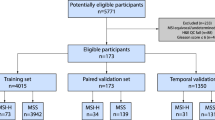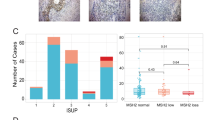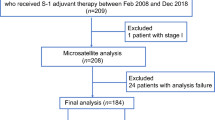Abstract
Microsatellite instability (MSI) was examined at 36 loci, and found in 9 (43%) of the 21 prostatic cancers. A loss of heterozygosity had occurred in five cases (24%). MSI did not correlate with clinical stage, but might play a role in the development of a subset of prostate cancers.
This is a preview of subscription content, access via your institution
Access options
Subscribe to this journal
Receive 24 print issues and online access
$259.00 per year
only $10.79 per issue
Buy this article
- Purchase on SpringerLink
- Instant access to the full article PDF.
USD 39.95
Prices may be subject to local taxes which are calculated during checkout
Similar content being viewed by others
Author information
Authors and Affiliations
Rights and permissions
About this article
Cite this article
Watanabe, M., Imai, H., Shiraishi, T. et al. Microsatellite instability in human prostate cancer. Br J Cancer 72, 562–564 (1995). https://doi.org/10.1038/bjc.1995.374
Issue date:
DOI: https://doi.org/10.1038/bjc.1995.374
This article is cited by
-
High homogeneity of mismatch repair deficiency in advanced prostate cancer
Virchows Archiv (2020)
-
Complex MSH2 and MSH6 mutations in hypermutated microsatellite unstable advanced prostate cancer
Nature Communications (2014)
-
The Application of Microsatellites in Molecular Pathology
Pathology & Oncology Research (1998)
-
Prostate cancer old problems and new approaches
Pathology & Oncology Research (1996)



